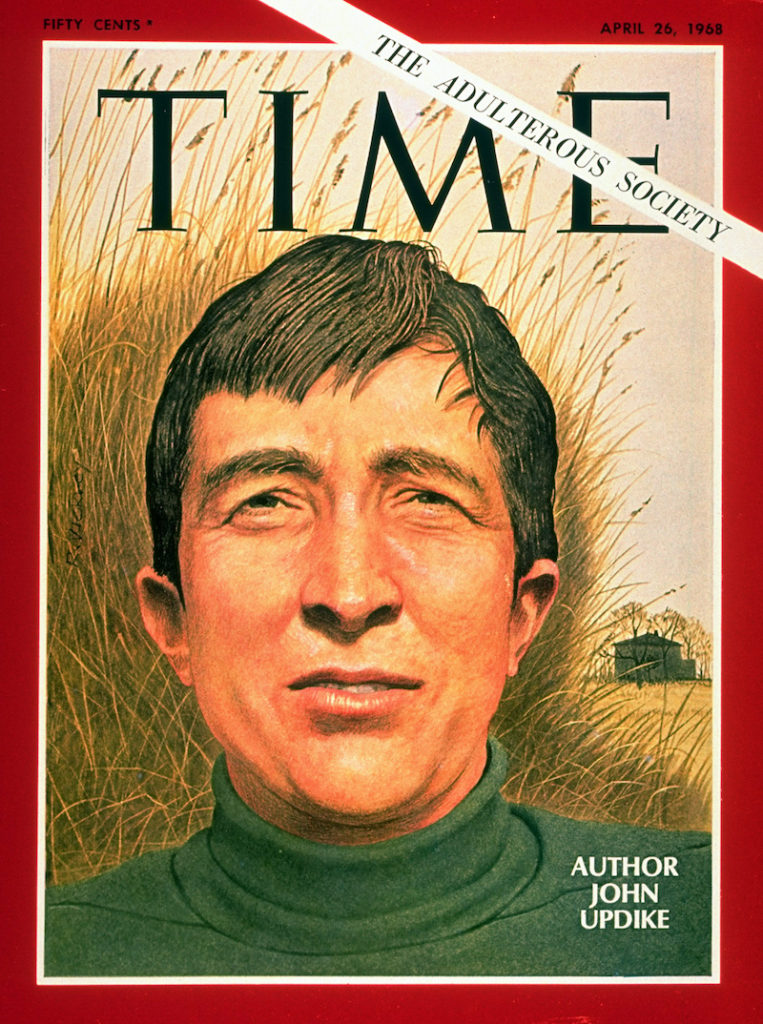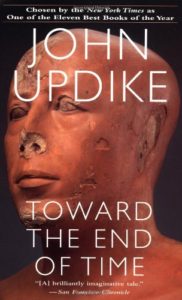

“Mailer, Updike, Roth–the Great Male Narcissists who’ve dominated postwar realist fiction are now in their senescence, and it must seem to them no coincidence that the prospect of their own deaths appears backlit by the approaching millennium and on-line predictions of the death of the novel as we know it. When a solipsist dies, after all, everything goes with him. And no U.S. novelist has mapped the solipsist’s terrain better than John Updike, whose rise in the 60’s and 70’s established him as both chronicler and voice of probably the single most self-absorbed generation since Louis XIV.
…
“Toward the End of Time concerns an incredibly erudite, articulate, successful, narcissistic and sex-obsessed retired guy who’s keeping a one-year journal in which he explores the apocalyptic prospect of his own death. It is, of the total 25 Updike books I’ve read, far and away the worst, a novel so mind-bendingly clunky and self-indulgent that it’s hard to believe the author let it be published in this kind of shape
I’m afraid the preceding sentence is this review’s upshot, and most of the balance here will consist of presenting evidence/ justification for such a disrespectful assessment. First, though, if I may poke the critical head into the frame for just one moment, I’d like to offer assurances that your reviewer is not one of these spleen-venting, spittle-spattering Updike-haters one encounters among literary readers under 40. The fact is that I am probably classifiable as one of very few actual sub-40 Updike fans.
…
“Most of the literary readers I know personally are under 40, and a fair number are female, and none of them are big admirers of the postwar G.M.N.’s. But it’s Mr. Updike in particular they seem to hate. And not merely his books, for some reason–mention the poor man himself and you have to jump back:
‘Just a penis with a thesaurus.’
‘Has the son of a bitch ever had one unpublished thought?’
‘Makes misogyny seem literary the same way Limbaugh makes fascism seem funny.’
These are actual-trust me-quotations, and I’ve heard even worse ones, and they’re all usually accompanied by the sort of facial expression where you can tell there’s not going to be any profit in arguing or talking about the esthetic pleasure of Mr. Updike’s prose. None of the other famous phallocrats of his generation–not Mailer, not Frederick Exley or Charles Bukowski or even the Samuel Delany of Hogg–excites such violent dislike … I think the major reason so many of my generation dislike Mr. Updike and the other G.M.N.’s has to do with these writers’ radical self-absorption, and with their uncritical celebration of this self-absorption both in themselves and in their characters.
…
“I’m guessing that for the young educated adults of the 60’s and 70’s, for whom the ultimate horror was the hypocritical conformity and repression of their own parents’ generation, Mr. Updike’s evocation of the libidinous self appeared redemptive and even heroic. But the young educated adults of the 90’s-who were, of course, the children of the same impassioned infidelities and divorces Mr. Updike wrote about so beautifully-got to watch all this brave new individualism and self-expression and sexual freedom deteriorate into the joyless and anomic self-indulgence of the Me Generation.
…
“It’s also got a lot of pages of Turnbull brooding about decay and mortality and the tragedy of the human condition, and even more pages of Turnbull talking about sex and the imperiousness of the sexual urge and detailing how he lusts after assorted secretaries and neighbors and bridge partners and daughters-in-law and a little girl who’s part of the group of young toughs he pays protection to, a 13-year-old whose breasts–‘shallow taut cones tipped with honeysuckle-berry nipples’–Turnbull finally gets to fondle in the woods behind his house when his wife’s not looking.
…
“The clunky bathos of this novel seems to have infected even the prose, John Updike’s great strength for almost 40 years. Toward the End of Time has occasional flashes of beautiful writing–deer described as ‘tender-faced ruminants,’ leaves as ‘chewed to lace by Japanese beetles,’ a car’s tight turn as a ‘slur.’ But a horrific percentage of the book consists of stuff like ‘Why indeed do women weep? They weep, it seemed to my wandering mind, for the world itself, in its beauty and waste, its mingled cruelty and tenderness.’
…
“Besides distracting us with worries about whether Mr. Updike might be injured or ill, the turgidity of the prose also increases our dislike of the novel’s narrator. This dislike absolutely torpedoes Toward the End of Time, a novel whose tragic climax is a prostate operation that leaves Turnbull impotent and extremely bummed.
…
“Maybe the only thing the reader ends up appreciating about Ben Turnbull is that he’s such a broad caricature of an Updike protagonist that he helps us figure out what’s been so unpleasant and frustrating about this gifted author’s recent characters. It’s not that Turnbull is stupid–he can quote Kierkegaard and Pascal on angst and allude to the deaths of Schubert and Mozart and distinguish between a sinistrorse and a dextrorse Polygonum vine, etc. It’s that he persists in the bizarre adolescent idea that getting to have sex with whomever one wants whenever one wants is a cure for ontological despair. And so, it appears, does Mr. Updike-he makes it plain that he views the narrator’s impotence as catastrophic, as the ultimate symbol of death itself, and he clearly wants us to mourn it as much as Turnbull does. I’m not especially offended by this attitude; I mostly just don’t get it. Erect or flaccid, Ben Turnbull’s unhappiness is obvious right from the book’s first page. But it never once occurs to him that the reason he’s so unhappy is that he’s an asshole.”
–David Foster Wallace, The Observer, October 13, 1997

